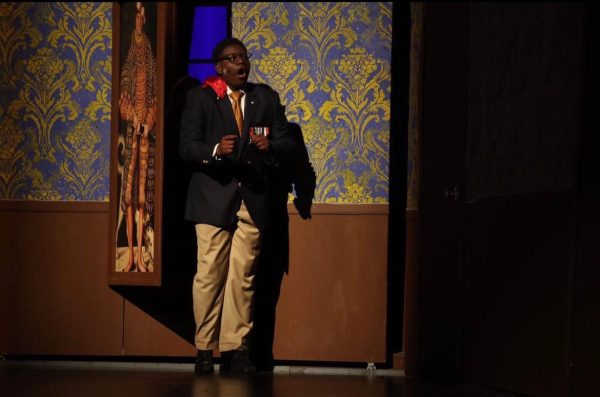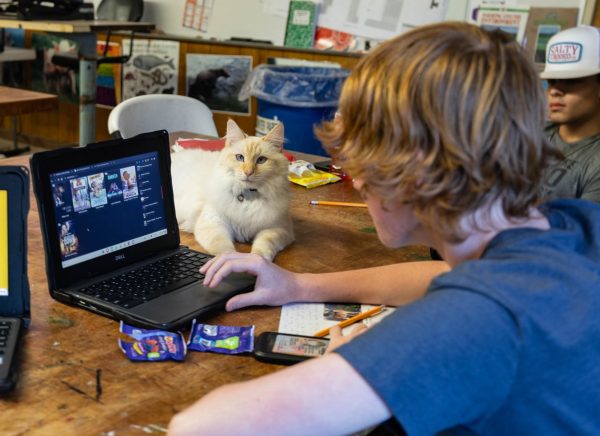The ins and outs of DCI
Experiences of Drum Corps International alumni
Life long hours of practice and weekends of tryouts help form how band teachers impact students lives.
November 30, 2020
Brandon Sams marches onto the field with the other members of the Blue Devils, equipment in hand— flag, rifle and sabre. The stadium lights are glinting over the freshly polished brass scattered around the field, and he knows he is about to take part in the biggest performance of his life. The year is 1997, and the finals are here at last, but the path getting here was long and grueling.
The audition process lasts weeks. Each weekend camp is another nerve-wracking experience for the people auditioning because they know that there are only three options from that point.
“By the end of the camp you know if you got a callback to come to another camp, a contract or you get cut,” Kayla Ogden, Cadets and Carolina Crown alum, said.
Ogden was an alternate in her high school band, but when she first saw a DCI (Drum Corps International) performance, she knew she had to audition. Her band director suggested trying a smaller corps to start, and her very first audition with Crossmen went well enough to get a callback, but then she was cut. As her confidence fell, Ogden’s director told her that someone he knew from Cadets let him know that there was an open mellophone spot — the instrument she just so happened to march. Ogden believed that she wouldn’t be able to make it into Cadets if she couldn’t get into Crossmen, but before she knew it, she was moving in for spring training.
“I got contracted as an alternate, but at that camp, one of the mellophone players [moved to trumpet],” Ogden said.
Just like that, her spot was secured. Ogden isn’t the only one who got in by the skin of her teeth though.
“It was me and this other guy. They pulled me out and then pulled him out, [then] pulled me out [and] pulled him out,” Paul Stivitts, Santa Clara Vanguard and Blue Knights alum, said. “Then all of a sudden [instructor] Ralph [Hartman] went inside the corps hall and talked to him, and we didn’t see him anymore. Ralph walked out and said, ‘Congratulations. This is the drumline for this year.’”
If they thought making the corps was hard, they had a big storm coming. Around May, the members of each corps move in to wherever they’re being housed and commence training. It is here that they learn the show, music and marching. These rehearsals are all day, every day, up to 12 or more hours per practice.
“[We were marching] about 10 to 15 miles a day on average. If you’re in color guard, it’s probably more because you’re running,” Stivitts said.
For him, this included an almost 20 pound snare drum hanging on him for most of the day.
Building up the stamina to spend so much time rehearsing is a road bump all new members find themselves going through.
“Unless you go into it already pretty fit, you’re going to struggle at first, because it’s going to be difficult. No one works hard for 10 [to] 12 hours a day; even people that do strenuous sports and stuff like that don’t work that hard,” Sams said.
Despite the steep learning curve, most every DCI alumni will insist that it was all worth it. Not only was DCI something that appealed to the band nerd deep inside most marchers, for some it is much more than just a thrilling, intense sport.
My second year was tough because I had some really [bad] personal stuff. [I tried to] take my own life, but one of the cymbal players heard about it. She just sat next to me on the bus on tours [and told me], ‘I’m gonna sit here and make sure that nothing happens to you.’
— Paul Stivitts
“There was stuff in my personal life that was really hard for me that I was going through [at] that time with family, and I just saw that as like a really cool outlet. [DCI would] take me out of that situation, and would make me a better person, a better musician. It would help me for my future,” Ogden said.
She loved it so much that she went on to march for five years.
For others, DCI was more than just an outlet — it was a lifesaver.
To this day, he keeps in touch with her and many of his other DCI friends. At the very least, the hectic drum corps life can be a great distraction. Moments to stop and rest are few and far between. For the members of any given corps, even one day off a week was generous.
“There are some [corps] that only got [a day off] maybe once every other week, and that was a laundry day. That was our free day,” Star of Indiana alum Steve Bennett said.
Bennett considers himself extremely lucky for that one day he got. Even if the corps got time to themselves, perhaps to sleep, they had only their thin camping mat rolled onto the floor of a high school gym.
Believe it or not, this experience, one that drains every bit of energy from a person, must be paid for. Just like a college education, which looks great on resumes and takes a lot of hard work and dedication just to be accepted, it is not free.
“The most expensive fee I paid was $500, but that was a long time ago. Now fees are upwards of $2,500 [to] $3,000 for [the] summer,” Sams said.
Ogden, whose final year in drum corps was 2017, had to start a GoFundMe in order to pay her fees, a tactic that has become popular over the past several years.
“I would post it online on Facebook, so I had old teachers, family members, whoever [donate]. Even some of my friends that had marched [DCI] and aged out and were band directors [now], they wanted to donate a little to me,” Ogden said.
It was an extensive process to get to this point with weeks of auditions, raising money for fees and all day rehearsals, but the first performance has arrived.
“I fell on my first show. I remember stepping in a hole. Next thing I know I’m trying to put my drum back on. We got done with the show, and the rest of the snare line didn’t know. The staff saw it and they laughed,” Stivitts said.
Stivitts admitted that for most of his first season of DCI, the percussion was the weakest link, but by the last competition, of which there were about 30, they had formed a connection to pull themselves up to near-perfection.
Sams and Bennett each won a gold medal at finals in Blue Devils and Star of Indiana respectively. The talent required to be accepted into a corps already puts the marchers above the average high school or college band, not to mention having the strength and endurance to be a part of the group that made it all the way to the top. Many would even argue that the best part of drum corps isn’t the chance to win or even the stamina built up through all the hours of physical activity, but the opportunities presented in the wake of the adventure. Bennett’s training with Star of Indiana gave him the resources to hone not only his teaching skills but the marching and playing skills of his students as well.
“My first job was a small school in Alabama, and they wanted me to come in and start a band program,” Bennett said. “[I was using] my knowledge [from] my drum corps experience. I was applying it to all these different things that we put together. We went to our first competition. Our first marching show, we got best in class. My last competition when I left there, we swept every category. That was our third year there.”
DCI’s intense schedule imbues its members with a need to constantly strive to be better, to be able to know how one slight difference in any one person’s performance can change the way the entire group runs.
I’m always thinking. [DCI] improved my work ethic, my mental stability. My mental endurance is stronger than I believe it ever would have been.
— Brandon Sams
“I can tell right away [when] I look at a drumline if the instructor has DCI experience or not. I can tell because there is just an attention to detail that DCI has. The difference between [two hand positions] is noticeable,” Stivitts said.
Even apart from the teaching world, many general skills for life are learned in DCI.
Members of drum corps are 21 or younger, so this experience is during a formative time in their lives. Luckily, it tends to form them in a positive way.
“I’ve learned how to be a functioning adult,” Ogden said. “I’ve learned things I wouldn’t have learned elsewhere — show up on time, have all your stuff ready to go, always have a good attitude, working really hard past my comfort zone. Even if it’s not physical, like working out or doing band, [when I think], ‘I don’t want to do this anymore, I’m tired,’ I know that I can [keep going] because I’ve already pushed myself past my comfort zone before, so I know how positive it can be on the other side.”




















